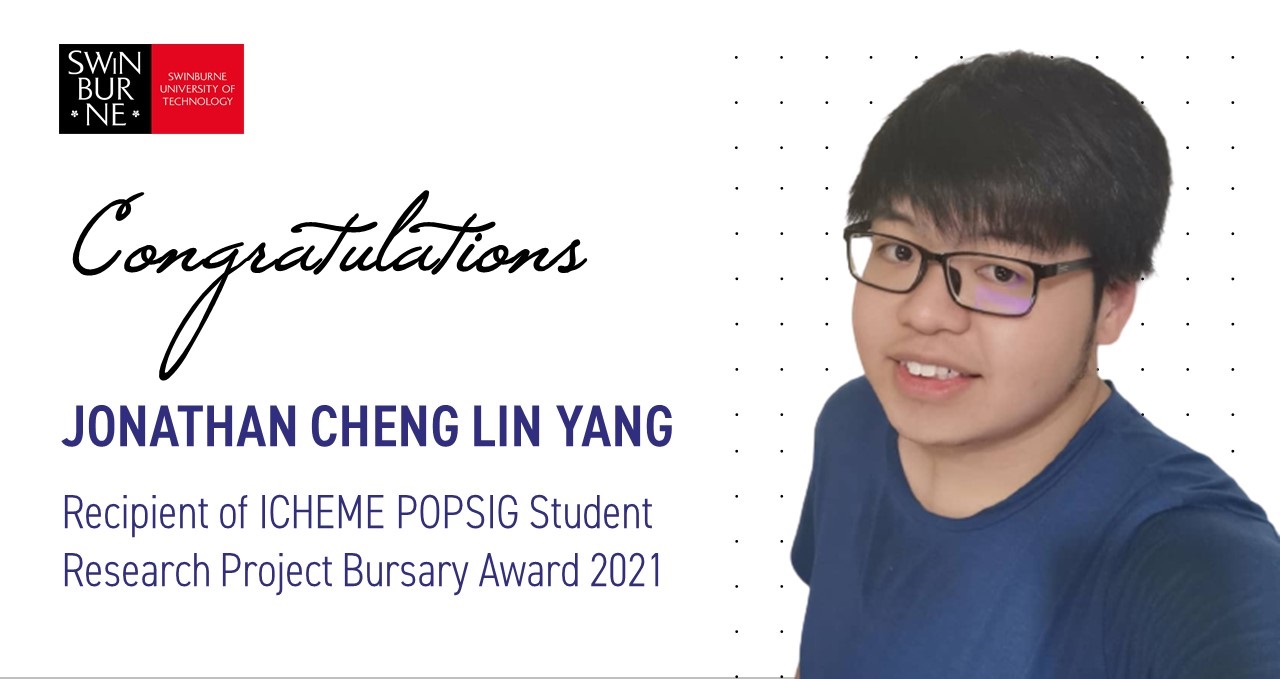KUCHING – A Swinburne Sarawak student was among four recipients awarded at this year’s Institution of Chemical Engineers (IChemE) Palm Oil Processing Special Interest Group (POPSIG) Student Research Project Bursary.
IChemE POPSIG promotes palm oil-related researches among undergraduate and postgraduate degrees, and acts as a forum to enable knowledge transfer, exchange of best practices, and sharing experience to all parties interested in the palm oil industry.
With his project titled ‘Thermogravimetric analysis and combined kinetic study on the pyrolysis of empty fruit bunches lignin extracted using sucrose-malic acid-water low transition temperature mixture’, Jonathan Cheng Lin Yang who is currently pursuing his Master of Engineering (Research) received a total of RM3,000 which will enable him to achieve more extensive project outcomes.
Cheng’s project aims to study the pyrolysis of lignin extracted from oil palm empty fruit bunches (EFB) using sucrose-malic acid-water low transition temperature mixture (LTTM) via thermogravimetric analysis (TGA) and kinetic modelling. Lignin is usually removed when EFB are subjected to the pre-treatment processes and generally discarded despite the potential to convert lignin into value-added chemicals and fuels. Under Cheng’s project, the research will investigate the suitability of LTTM as a more economical and sustainable alternative to isolate lignin from EFB.
His supervisory team includes Swinburne Sarawak’s Faculty of Engineering, Computing, and Science Associate Professor Jaka Sunarso, and lecturers Dr Chew Jiuan Jing and Dr Elaine Yeu Yee Lee. Cheng is also mentored by Swinburne Australia’s Dr Nishar Hameed and Monash University Malaysia’s senior lecturer Dr Joseph Ho Yong Kuen.
According to Cheng, lignin is the second most abundant natural polymer. However, it is not naturally available in its isolated form, resulting in an underutilisation of this sustainable, environmentally-friendly material.
“By converting lignin into value-added chemicals and fuels using green and nature-based solvents, my research seeks to mitigate the global reliance on fossil fuels and reduce environmental issues,” Cheng said.
In line with Swinburne’s Horizon 2025 strategic plan of bringing people and technology together to build a better world, Swinburne’s ‘moon shot’ commitment towards being the prototype university of global best practice will pave the way for an institution focused on the future within a changing environment.
For more information about Swinburne, visit its website www.swinburne.edu.my, Facebook page (@swinburnesarawak), Instagram (@swinburnesarawak), Twitter page (@Swinburne_Swk) or YouTube channel (Swinburne Sarawak).


